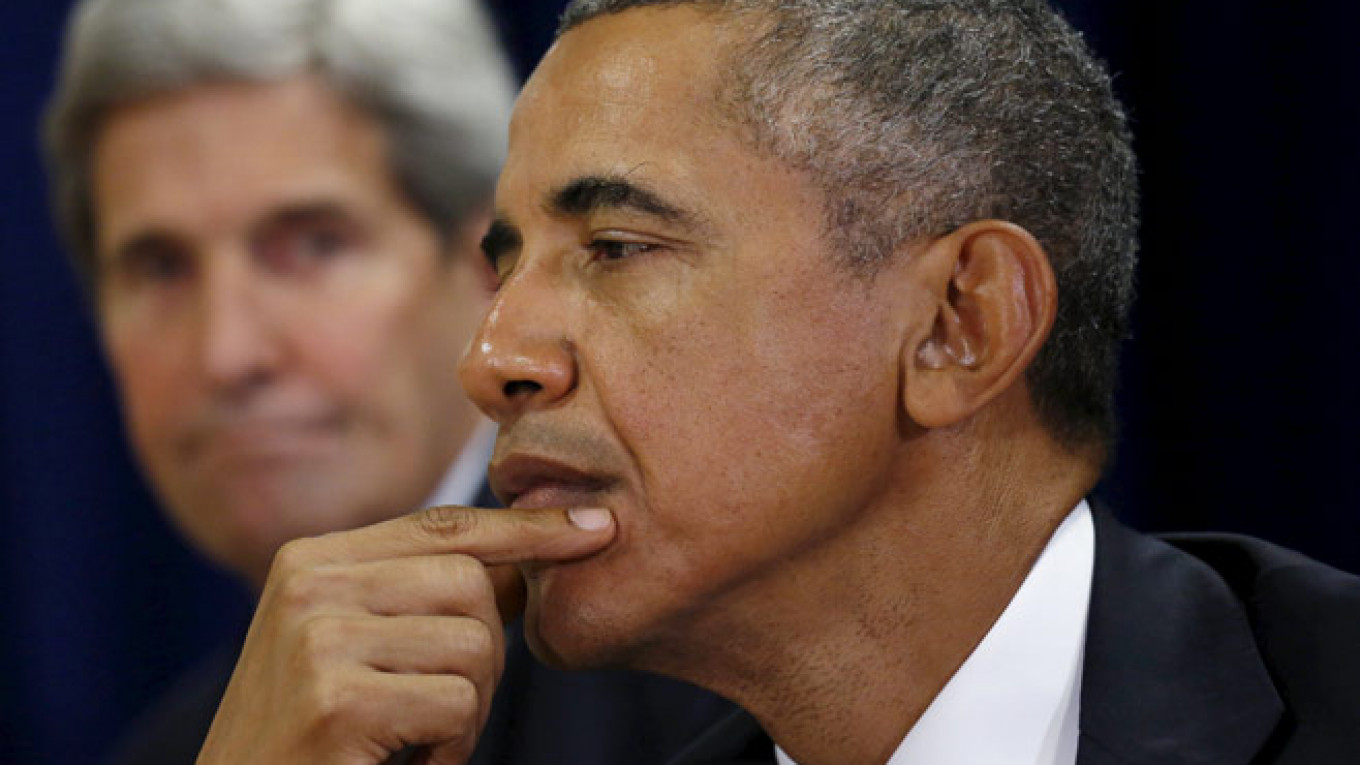Russia's military buildup in Syria appears to have forced U.S. President Barack Obama to two unpalatable conclusions: He cannot ignore Moscow, and Syrian President Bashar Assad may survive for some time.
Russian President Vladimir Putin, isolated after his annexation of Crimea and support for separatists in eastern Ukraine, secured a meeting with Obama on Monday largely as a result of his surprise movement of planes and tanks into Syria.
Both sides said they were looking for ways to work with one another to end the Syrian civil war. And, according to a U.S. official, they agreed their militaries should coordinate to prevent Russian and U.S.-led coalition forces from inadvertently clashing over Syria.
A U.S. official told Reuters that the United States believes Russia has sent four Sukhoi Su-34 "Fullback" fighter-bombers, its latest deployment of aircraft to a base near the Russian naval facility at Tartus on Syria's Mediterranean coast.
With Moscow a staunch backer of Assad and keen to keep its foothold in the Middle East, analysts said the buildup may force Washington to abandon its goal of Assad's departure, at least for now.
As Obama's former Middle East policy coordinator, Phil Gordon, has argued, the White House may need to explore ways to stop the bloodshed and alleviate the human suffering while holding its nose over Assad's departure.
At least 200,000 people have died in the conflict, displacing millions and leading to the rise of the Islamic State militant group, which has exploited the power vacuum to seize control of parts of Syria and neighboring Iraq.
"What's needed is a new diplomatic process that brings all the key external actors to the table and agrees on a messy compromise to de-escalate the conflict — even if that means putting off agreement on the question of Assad," Gordon, who worked at the White House until April, wrote on Friday in Politico Magazine.
Despite the stated U.S. position that Assad has lost the legitimacy to lead Syria and must go, officials have long said they see no policy likely to achieve this at an acceptable cost.
As a result, for months they have tacitly lived with Assad staying in power and made no bones that their focus is to combat the Islamic State, also known as ISIL and ISIS, rather than push Syria's president from power.
Kerry Probes for New Political Track
Fresh from negotiating the July 14 nuclear deal with Iran, U.S. Secretary of State John Kerry has spent much of his week at the UN General Assembly probing to find a new political track on Syria and to assemble a new "contact group" after multiple diplomatic failures on Syria.
The group, if it emerges, is likely to include Britain, Germany, France and an array of Middle East players including Saudi Arabia, Qatar and Turkey, which have backed the uprising against Assad and the campaign against the Islamic State.
Saudi Foreign Minister Adel Jubeir told reporters he expected greater military support for the rebels fighting Assad, though he declined to say what his country might do, and he said it was "inconceivable" for Assad to stay under a political deal.
Another option being explored, Western officials said, is a group modeled on the P5+1 — Britain, China, France, Germany, Russia and the United States — that came together for the Iran nuclear talks.
Kerry acknowledges that bringing all sides together will be hard without an agreement on Assad's future at the outset.
"Even if President Obama wanted to just play along … there are 65 million Sunni [Arabs] in-between Baghdad and the border of Turkey, Syria and Iraq who will never, ever again accept Assad as a legitimate leader," Kerry told MSNBC's "Morning Joe" program on Tuesday. "Russians need to understand that you cannot have peace unless you resolve the question of Sunni buy-in."
Foreign policy analysts said that the best solution might be to leave the question of Assad's future until later.
"If Assad's departure and the defeat of ISIS and a peaceful future for Syria is the ultimate desired outcome, don't try to achieve all that in phase one." said Matthew Rojansky of the Washington-based Wilson Center think tank. "That can be phase two. That can be phase five."
Rojansky, an expert on U.S. relations with Russia, said a first phase could be to work on the area that Washington and Moscow agree on: defeating the Islamic State, even if that means that Assad's hand is marginally strengthened.
A Message from The Moscow Times:
Dear readers,
We are facing unprecedented challenges. Russia's Prosecutor General's Office has designated The Moscow Times as an "undesirable" organization, criminalizing our work and putting our staff at risk of prosecution. This follows our earlier unjust labeling as a "foreign agent."
These actions are direct attempts to silence independent journalism in Russia. The authorities claim our work "discredits the decisions of the Russian leadership." We see things differently: we strive to provide accurate, unbiased reporting on Russia.
We, the journalists of The Moscow Times, refuse to be silenced. But to continue our work, we need your help.
Your support, no matter how small, makes a world of difference. If you can, please support us monthly starting from just $2. It's quick to set up, and every contribution makes a significant impact.
By supporting The Moscow Times, you're defending open, independent journalism in the face of repression. Thank you for standing with us.
Remind me later.






